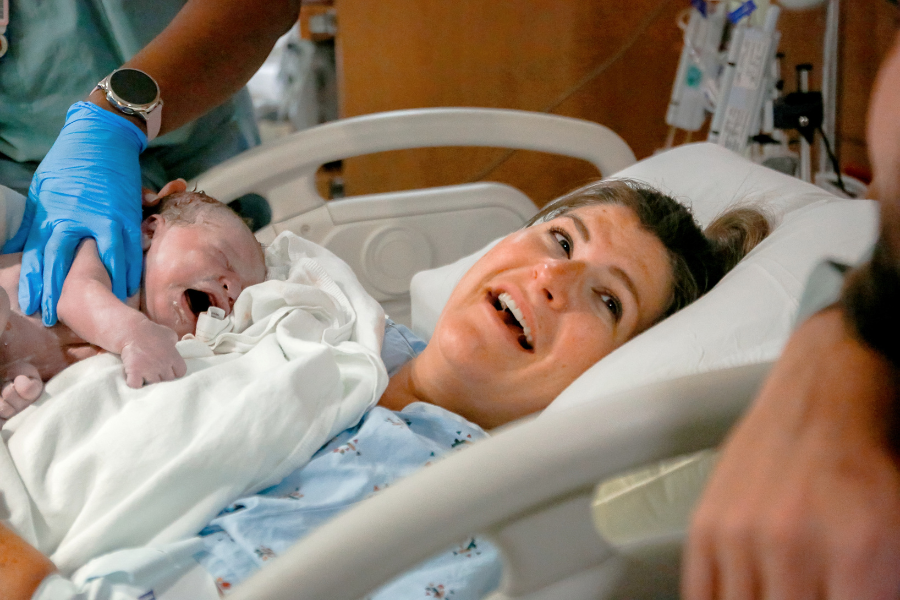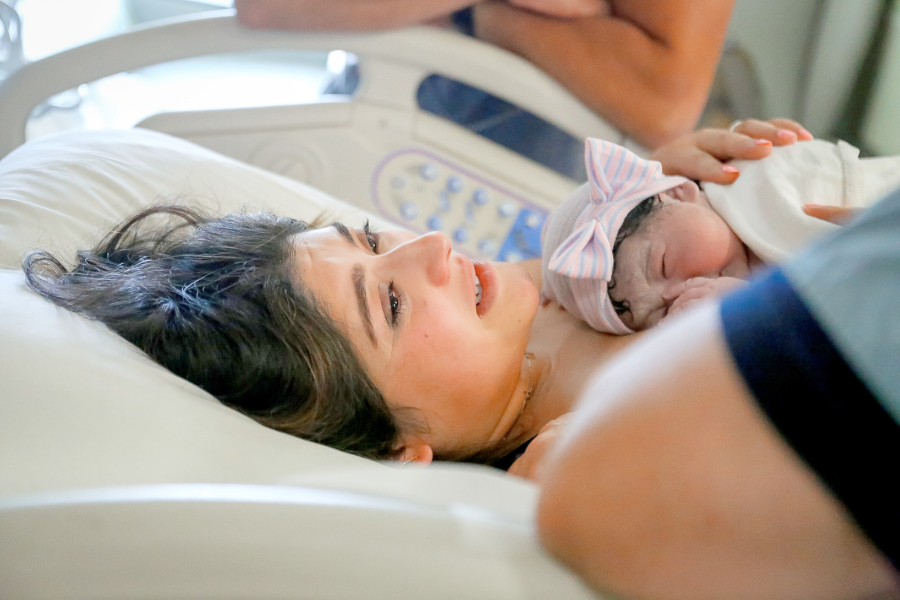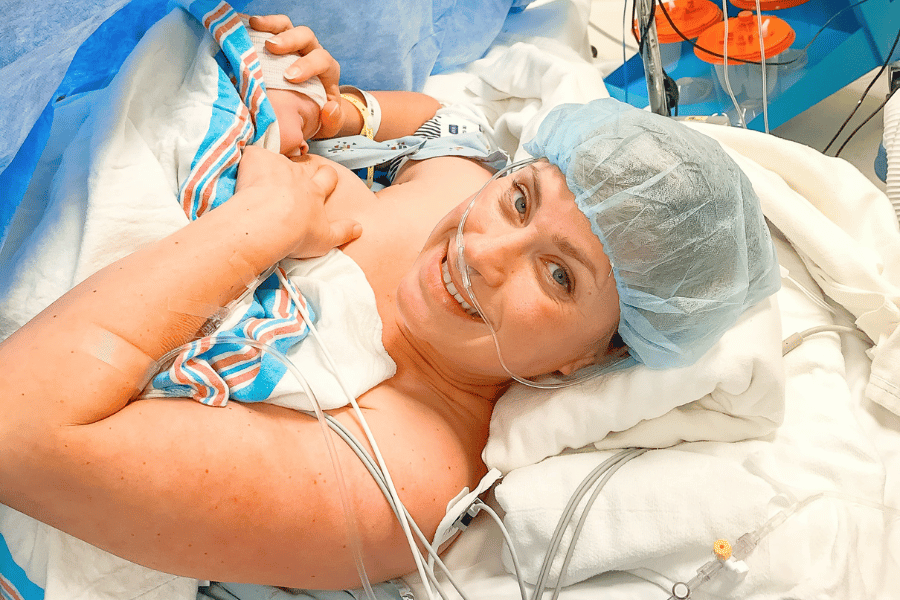Any amount or type of belly pain during pregnancy can be alarming and scary. Thankfully, though, it doesn’t always mean something is wrong. Belly aches and pains can (and often do!) happen throughout pregnancy.
Knowing why it happens and when you should be concerned is key to understanding belly pain and managing any associated anxiety or stress. So, without further ado, let’s learn more about cramping during pregnancy.
Follow @mommy.labornurse on Instagram to join our community of over 650k for education, tips, and solidarity on all things pregnancy, birth, and postpartum!
Cramping in early pregnancy?
Is cramping in early pregnancy normal? The answer is actually yes and no! Let me preface this by saying that anytime you have concern about pain, or anything else in your pregnancy for that matter, do not hesitate to contact your specific OB provider.
Yes, I am a medical professional, but I am not your medical professional so do not heed this as personal advice. Cramping in early pregnancy can happen, and often does, but that doesn’t mean it’s something to be ignored.
How much cramping is normal in early pregnancy?
So, exactly how much cramping is normal in early pregnancy? This is an excellent question! In early pregnancy it’s not uncommon to experience a cramping sensation as your uterus begins to expand. This expansion of your uterus causes muscle tension and a cramp-like sensation.
If the cramping you feel in early pregnancy feels similar to menstrual cramps and is not accompanied by any other symptoms, I wouldn’t be too worried. If, however, the cramping is more severe or is accompanied by any amount of vaginal bleeding or unusual vaginal discharge, let your OB provider know promptly.
Early pregnancy cramping is usually brief and mild. You might notice it’s worse with abrupt position changes, sneezing, or coughing.
Related Reading: 5 Important Signs to Call Your Doctor When Pregnant!
How long does early pregnancy cramping last?
There are more causes than one for early pregnancy cramping (we’ll get to that next), so how long it lasts can vary. I wouldn’t expect the cramping to last longer than a few minutes but it might come and go several times over the course of a few hours or even days.
If you are experiencing cramping that is not resolving on its own I would advise you to change your position, drink some water, and rest. If these things don’t minimize or eliminate the cramping then give your provider a call.
What causes cramping in early pregnancy?
There are a few things that might cause cramping in early pregnancy. Keep reading to learn more!
Uterine expansion
Earlier we talked about how cramping might be related to your uterus expanding in pregnancy. Your uterus gets bigger before your baby starts to fill the space, and this growth in itself can cause cramping.
Implantation
Some women actually experience a cramping sensation when the fertilized egg implants into the lining of the uterus.
What’s more, you may experience a little bit of vaginal bleeding during this process too. Just like with cramping, vaginal bleeding doesn’t always mean something bad is happening, but any bleeding should be promptly reported to your provider.
Gas or digestion issues
The production of certain hormones in pregnancy can actually impact your gastrointestinal (GI) tract. It can slow down the digestion process and lead to bloating, gas, and other uncomfortable GI issues.
Miscarriage
According to The American College of Obstetricians and Gynecologists, “The loss of a pregnancy before 13 completed weeks is called early pregnancy loss.” (source) Bleeding is the most common sign of early pregnancy loss but you might also experience abdominal cramping and pain.
Implantation cramps?
I touched on this a bit above but yes, the implantation process can cause you to experience cramping in early pregnancy, well before your missed period. Though keep in mind, not everyone experiences implantation cramping.
Is cramping an early sign of pregnancy?
Yes, cramping might be an early sign of pregnancy! For some women, the cramping is what prompts them to take a pregnancy test in the first place.
It might be difficult to differentiate between early pregnancy cramping and premenstrual cramping, so I wouldn’t use it alone as a confirmation of pregnancy.
Other reasons for cramping during pregnancy?
Braxton Hicks
Braxton Hicks can occur at different times for different women. It’s not uncommon to experience Braxton Hicks earlier in pregnancy if it’s not your first pregnancy but most women experience them in the late second and third trimester.
Every pregnancy is different though. Some women have irritable uteruses and tend to have more Braxton Hicks contractions. Other things like increased activity, sex, a full bladder, and dehydration, might make you more prone to Braxton Hicks as well.
Related Reading: What Do Braxton Hicks Contractions Feel Like?
Dehydration
Your uterus is a big muscle, and like other muscles in your body, when you are dehydrated the muscle will contract. This is a pretty common cause for cramping and uterine irritability during pregnancy so stay hydrated, mama!
Sex
During an orgasm your body releases oxytocin. This release of oxytocin during sex can cause your uterus to contract a little bit and cause some cramping. And guess what?? A synthetic version of oxytocin (Pitocin) is actually what we use in the hospital to help induce or augment a woman’s labor. Cool, right?!
Note: unless you have been advised otherwise by your provider, it should be completely safe to have sex during pregnancy.
When to worry about cramping during pregnancy?
We’ve talked a lot about what normal cramping in pregnancy looks like but there are times when cramping can be concerning. When should you worry about cramping during pregnancy? If the cramping is severe, unrelieved by certain interventions, or accompanied by bleeding or anything else unusual, it might be a cause for concern.
Miscarriage
Bleeding is the most common sign of miscarriage, but many women experience abdominal cramping as well. If you experiencing these symptoms at any point during your pregnancy, let your provider know ASAP!
Ectopic pregnancy
An ectopic pregnancy occurs when a fertilized egg attaches itself somewhere outside of the uterus. While not common, an ectopic pregnancy is a medical emergency that requires prompt attention. The majority of women who have an ectopic pregnancy experience pelvic or abdominal pain, among other symptoms.
Preterm labor
Preterm labor is labor that starts before 37 weeks of pregnancy. Preterm labor does not always equate to preterm birth but often preterm labor does require medical interventions and monitoring.
Preterm labor looks different for everyone. To learn more, be sure to check out my post below!
Infections
Some infections, especially those of the urinary and pelvic regions, can cause abdominal cramping. Infections are not always a huge cause for concern but an untreated infection during pregnancy can have some negative outcomes.
If you experience abdominal cramping accompanied by discomfort or burning when urinating, abnormal discharge, or anything else concerning let your provider know so they can test you for a UTI or other infections.
Placental abruption
Also a medical emergency, placental abruption happens to roughly 1 in 100 pregnant women and is most common in the third trimester. An abruption happens when part of the placenta detaches from the uterine wall before birth. Placental abruptions can be mild or severe and are usually accompanied by sudden abdominal or back pain, among other symptoms.
Preeclampsia
Not typically associated with abdominal cramping, you can experience upper abdominal pain with preeclampsia. Other symptoms of preeclampsia include a headache unrelieved by medicine, blurry vision or seeing spots, and sudden weight gain.
Related Reading: An L&D Nurse Discusses Gestational Hypertension and Preeclampsia
Uterine rupture
Another rare medical emergency in the obstetrics world is a uterine rupture. If you have previously had a C-section or any kind of surgery on your uterus, you are at a slightly increased risk for uterine rupture (but still not high).
The tell-tale sign of a uterine rupture is severe, constant abdominal pain. This pain, different from contraction pain, is something I hope you never have to experience.
Relief for cramping during pregnancy?
Looking for ways to relieve cramping, pain, and discomfort during pregnancy? You are in the right place, mama!
The key to relieving cramping in pregnancy is to target relief efforts at the cause of the cramping. Here are some things to try!
Rest
Over exerting yourself can cause you to experience abdominal cramping. When in doubt, it would never be wrong to get off your feet and let your body rest. This especially holds true as your belly grows bigger and those muscles and ligaments around your stomach get nice and stretched out.
Hydrate
Another fairly common cause of abdominal cramping in pregnancy is dehydration. The typical recommended water intake during pregnancy is about 10 glasses per day – which is a whole lotta water!
Depending on your activity level, where you live, and the current climate, your water needs might fluctuate a bit.
Warm bath
There has been a myth circling around for decades saying it’s not safe to take a warm bath during pregnancy. This is simply not true for the majority of healthy pregnant women. Of course, if your provider has recommended you abstain from warm baths for any particular reason, you should absolutely listen to them.
A warm bath is a great way to relax and help combat some of those common pregnancy induced aches and pains. As a general rule, don’t step into a bath that is uncomfortably hot. If you are comfortable when you step in then you should be good!
To learn more about taking baths during pregnancy, check out the post below.
Support band
This is more for later in pregnancy but some women find relief using a belly band early on in pregnancy. These bands work by relieving pregnancy-related pressure from the abdomen, hips, and lower back. What’s more, most bands are insurance eligible so there’s really no reason to not get one.
My personal favorite belly band is made by Motif Medical, which you can find here!
Wrapping up
I hope this article has helped ease your mind when it comes to cramping in pregnancy. It can be so hard to know what’s normal and what’s not, especially if it’s your first pregnancy. But at the end of the day, if something doesn’t feel right with you, please, please, please notify your OB provider.
If you are looking for more educational MLN resources, take a peek at the ones below!






